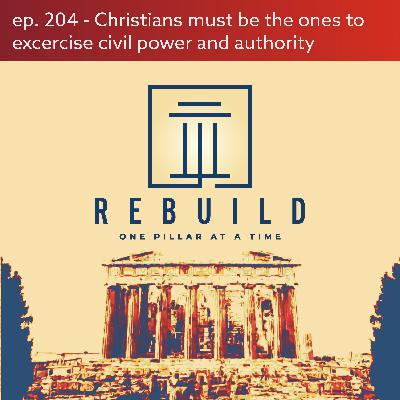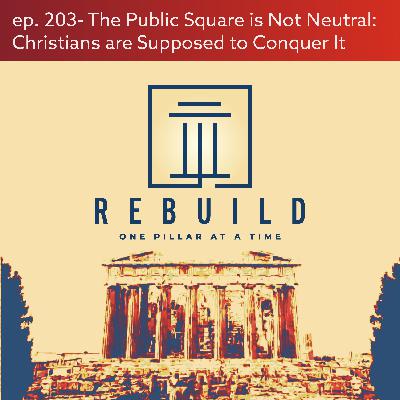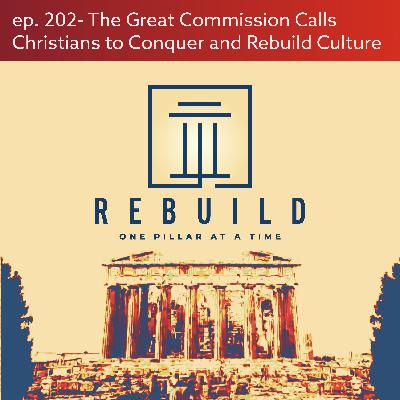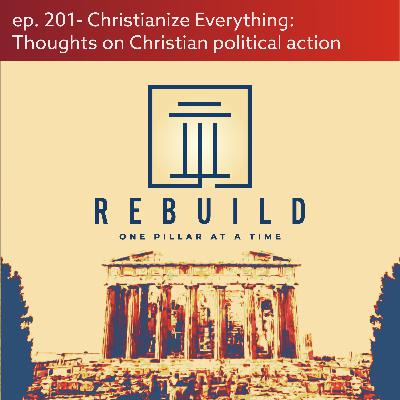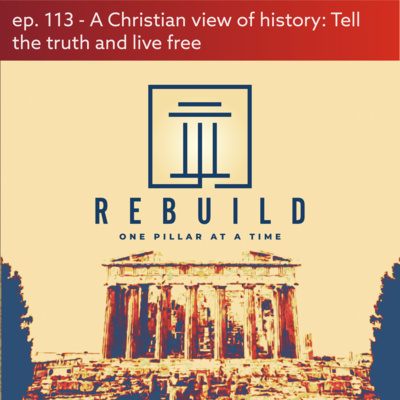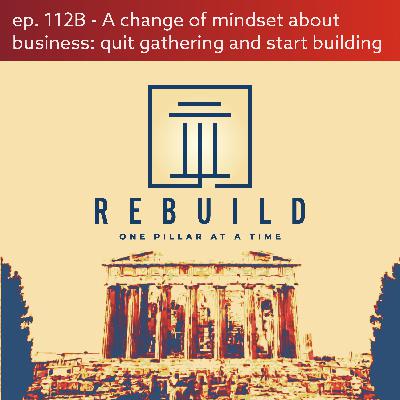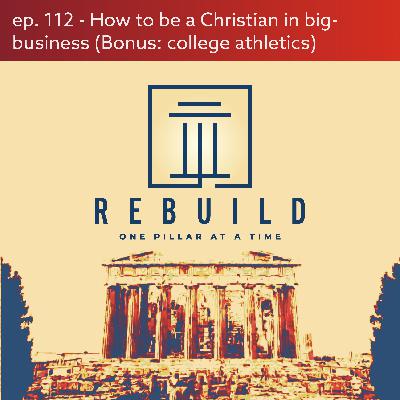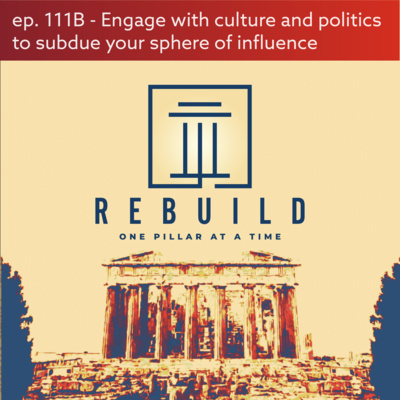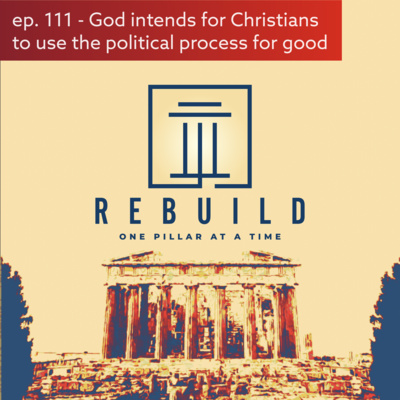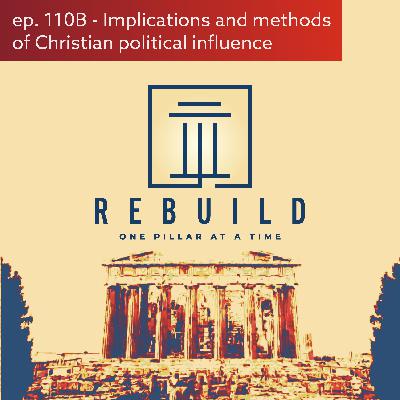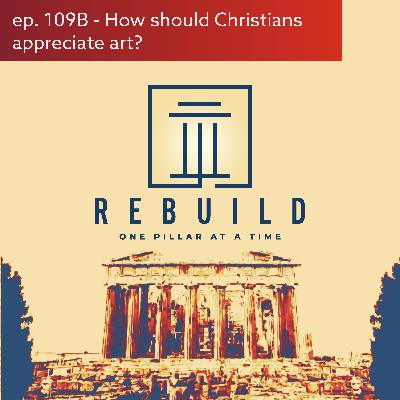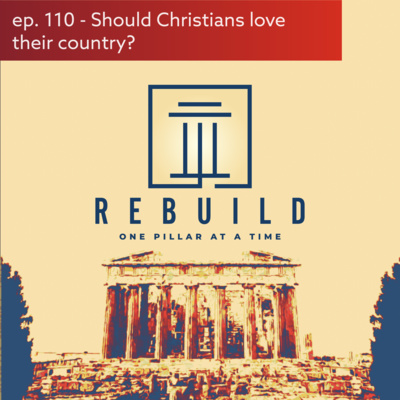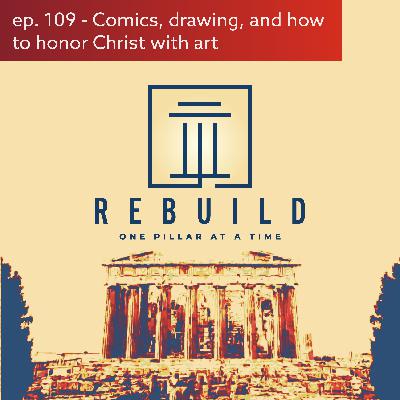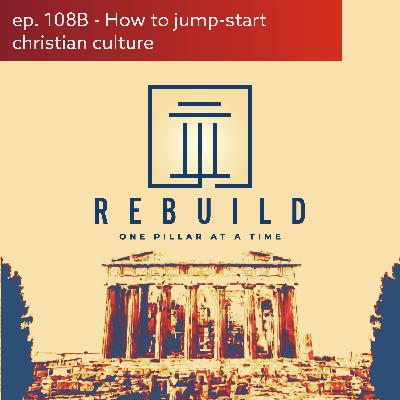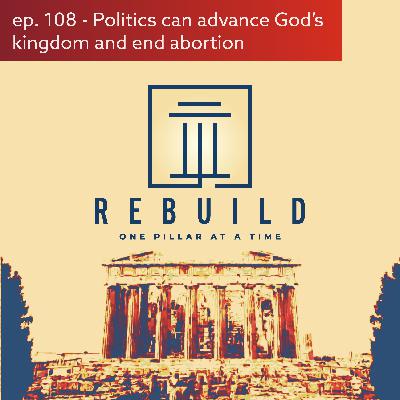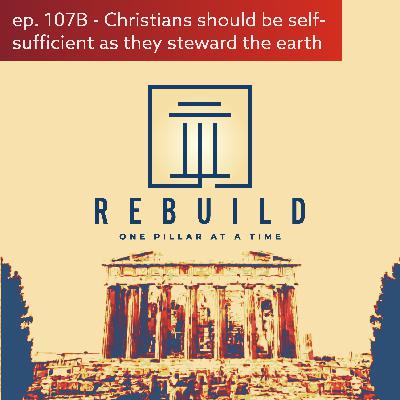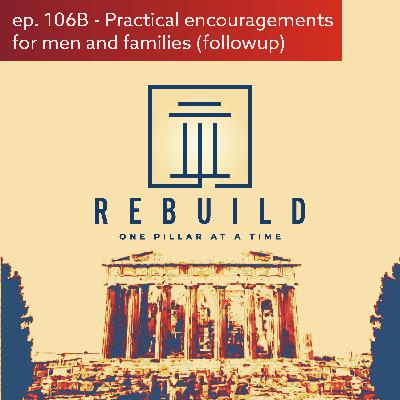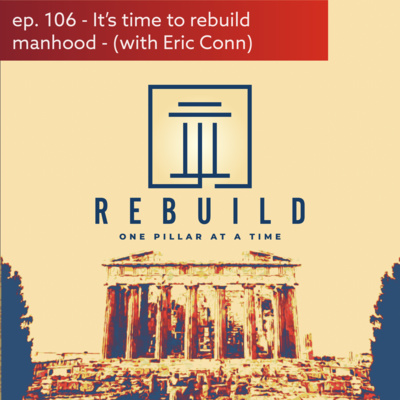Discover Rebuild
Rebuild

Rebuild
Author: Michael Belch
Subscribed: 4Played: 43Subscribe
Share
© Michael Belch
Description
Welcome to Rebuild. Here we explore the pillars that hold up the foundation of Christianity and western civilization. We examine where and how these pillars are crumbling, and we suggest ways that we can rebuild them.
We release two episodes per week. The first is an interview with a guest who answers questions about a particular pillar of society. The second episode is a reaction to the interview where Michael and Bradley tease out implications and offer commentary.
We release two episodes per week. The first is an interview with a guest who answers questions about a particular pillar of society. The second episode is a reaction to the interview where Michael and Bradley tease out implications and offer commentary.
39 Episodes
Reverse
This episode examines C.S. Lewis' argument in "Men Without Chests" where Lewis argues that men who do properly love things cannot appreciate them or know their proper use and function. From there it examines how Christians, because of the gospel, must love their nation and their homes.
SUMMARY:
This episode argues that because the civil magistrate is God's deacon to help accomplish one of the two primary purposes for mankind, Christians should pursue civil office and willingly wield its power to lead their nation in righteous and effective ways.
ACKNOWLEDGEMENTS:
"Music by Kabbalistic Village" - kabbalisticvillage.com/
This episode rejects the claim that the public square it neutral. It argues that Christians ought to vigorously enter the public square and destroy all evil and foolish ideas that set themselves up against the knowledge of God.
This episode starts with a tweet from Scott Aniol about what the gospel should do to culture. We disagree with the tweet and explain that God actually calls Christians to build culture because of the great commission. Last, we conclude that God wants us to bring all areas, including sexuality, under submission to Christ.
This episode explores how Christians should think about nations and political involvement. We consider how Psal 144:15 applies to current political questions.
Questions this episode considers:
Is it good for Christians to 'bring Christianity into the public square'?
What does it mean to christianize a nation?
SUMMARY:
In this episode we talk with Jon Harris about how Christians should view and study history. We explore how conservatives should defend against the left without compromising the truths of history. We also talk about the idea that our assumptions about the future dictate what we will find in the past. Jon clarifies some false assumptions on our part and offers hope to people who have been told that they must feel guilt over sins of past generations.
GUEST INFORMATION:
Jon is a committed Christian and enjoys outdoor sports and music. He repented of his sins and put his trust in the grace of Jesus Christ for full and immediate forgiveness as a child. When he’s not hiking or playing guitar, Jon writes about political and theological issues confronting the church. He has an MDiv from Southeastern Baptist Theological Seminary and an M.A. in History from Liberty University. He was interested in political theory from a young age but sensed a stronger desire for ministry. During his college years Jon worked in campus ministry and also served as a minister of music at his church.
Jon’s Podcast: Conversations that Matter
Jon’s Website: Worldview Conversations
Documentary Work: Last Stand Studios
QUESTIONS THIS EPISODE ASKS:
In his lectures on American history, Steve Wilkins says that secular scholars cannot study history accurately because when they come across figures and events that display the glory and truthfulness of God, they suppress that truth. David and Tim Barton call God’s hand in history “the golden thread” in their book “The American Story, The Beginnings”. Could you talk about 1 or 2 “golden thread” moments that stand out to you?
How can we tell the truth about history without giving up ground to the left and progressive Christians?
What role does history play in the command to honor our father and mother?
What is something practical that Christians can do in order to understand and teach history in a more ‘Christian’ way?
Should Christians feel guilt for past sins committed by previous generations?
RECOMMENDED RESOURCES FOR FURTHER INTEREST:
https://www.brionmcclanahan.com
https://mcclanahanacademy.com
ACKNOWLEDGEMENTS:
"Music by Kabbalistic Village" - kabbalisticvillage.com/
SUMMARY:
This is our follow-up discussion from our interview with Eric Bell. We discuss the idea that Christians can build the kingdom of God by building business and culture. Churches and Christians need to take this seriously by promoting and funding businesses that honor God. We also need to change the way we think about money from a frugal mindset to a building mindset..
RECOMMENDED RESOURCES:
The King’s Hall: Wealth, Money, Space
GUEST INFORMATION:
Eric's career spans almost 20 years in sales and management. He has held roles such as sales rep, sales trainer, regional manager, area director of sales, and strategic account manager. He started off working for GANZ USA, a giftware company based out of Atlanta GA. After ten successful years there, He transitioned to working for a Medical Device company named Stryker in 2012 as a Patient Care Account Manager. In 2016, Eric was promoted to Northwest Regional Manager, and developed key IDN relationships, and built a team of sales people to cover 5 states.
OUTLINE OF OUR DISCUSSION
INTRO: What are we striving for? - avoid fatalism
Can Christians stay in businesses that embrace ungodly philosophies?
How can Christians prioritize and help start Christian businesses?
We need to change our mindset from frugality to building.
ACKNOWLEDGEMENTS:
"Music by Kabbalistic Village" - kabbalisticvillage.com/
SUMMARY:
Most companies are not Christian companies. This creates questions and opportunities for Christians who work in those companies. This episode explores how Christians can honor their bosses, how to think through a company that promotes ungodly causes, and also concludes with a bonus discussion on whether college athletes should be paid..
GUEST INFORMATION:
Eric's career spans almost 20 years in sales and management. He has held roles such as sales rep, sales trainer, regional manager, area director of sales, and strategic account manager. He started off working for GANZ USA, a giftware company based out of Atlanta GA. After ten successful years there, He transitioned to working for a Medical Device company named Stryker in 2012 as a Patient Care Account Manager. In 2016, Eric was promoted to Northwest Regional Manager, and developed key IDN relationships, and built a team of sales people to cover 5 states.
QUESTIONS THIS EPISODE ASKS:
How do business minded Christians engage in this corporate world?
What advice would you give to Christians who are specifically in leadership in a secular company?
As someone who is involved in business leadership, what advice would you give to Christians if their company is embracing worldly philosophies (such as promoting the LGBTQ agenda at work), but it is not directly affecting that Christian’s job? It has simply become part of the corporate ethos, and something that the company wants to associate itself with publicly?
Several high-profile companies have recently embraced wokeness in a big way. Disney is probably the most prominent. But several other companies have tried that and it has led them to back away from from the woke and progressive mob (an example is Netflix). Do you think that companies should be involved in social positions, political messaging, or things like this? What about Christian companies who want to be vocal about the gospel?
Do you think that the business world is becoming increasingly hostile to the Christian worldview?
What do you think it is about the "businessman" that has given him a bad reputation in society? Charles Dickens "A Christmas Carol" and many other fictional classics certainly portrayed truths about the ruthlessness of businessmen. Today I consider businessmen either slick talkers with charm and no depth or cut throat and almost sinister.
BONUS: Should college athletes be paid and/or allowed to make money for their likeness?
RECOMMENDED RESOURCES FOR FURTHER INTEREST:
ACKNOWLEDGEMENTS:
"Music by Kabbalistic Village" - kabbalisticvillage.com/
SUMMARY:
This is our follow-up discussion from our interview with Levi Minderhoud. We discuss the principle that we can expand the kingdom of God by declaring his truth (the law) and his gospel in our own small areas of influence. This can include school districts, libraries, and towns. It is loving and honors God when we advocate for his truth and standards. As we do this, we partially carry out the mandate to subdue the earth.
GUEST INFORMATION:
Levi Minderhoud joined the staff of the Association for Reformed Political Action (ARPA) Canada in June of 2019 as ARPA’s first British Columbia Manager. He is dedicated to raising the political activity and knowledge of Reformed Christians in British Columbia, bringing a Christian worldview to members of the British Columbia legislature, and developing public policy from a Christian perspective.
Prior to joining ARPA on a full-time basis, Levi already had political and policy experience elsewhere. He has a bachelor’s degree from Dordt University in political science, business, and economics and a Master’s of Public Policy degree from Simon Fraser University. He interned with a Member of Parliament (the late MP Mark Warawa) and within a federal department (Transport Canada). He also assisted in leading a local ARPA chapter (ARPA Fraser Valley East).
Levi and his wife Jillian currently live in Abbotsford, British Columbia.
You can find out more about his work at ARPA here: https://arpacanada.ca/
OUTLINE OF OUR DISCUSSION
INTRO: What are we striving for? - avoid fatalism
Holy optimism
What is the right tone/approach?
Christians need to repent if they have embraced the sins that are common in culture, but then we need to move forward with confidence.
ACKNOWLEDGEMENTS:
"Music by Kabbalistic Village" and link to my website - kabbalisticvillage.com/
SUMMARY:
Abraham Kuyper once pointed out that “Calvinism is an all-embracing system of principles... It is rooted in a form of religion which was peculiarly its own, and form that specific religious consciousness there was developed first a particular theology, then a special church-order, and then a given form for political and social life.” In this episode we talk with Levi Minderhoud about Christian political involvement and how Abraham Kuyper’s thoughts ought to inform our efforts to bring God’s principles into political life.
GUEST INFORMATION:
Levi Minderhoud joined the staff of the Association for Reformed Political Action (ARPA) Canada in June of 2019 as ARPA’s first British Columbia Manager. He is dedicated to raising the political activity and knowledge of Reformed Christians in British Columbia, bringing a Christian worldview to members of the British Columbia legislature, and developing public policy from a Christian perspective.
Prior to joining ARPA on a full-time basis, Levi already had political and policy experience elsewhere. He has a bachelor’s degree from Dordt University in political science, business, and economics and a Master’s of Public Policy degree from Simon Fraser University. He interned with a Member of Parliament (the late MP Mark Warawa) and within a federal department (Transport Canada). He also assisted in leading a local ARPA chapter (ARPA Fraser Valley East).
Levi and his wife Jillian currently live in Abbotsford, British Columbia.
You can find out more about his work at ARPA here: https://arpacanada.ca/
QUESTIONS THIS EPISODE ASKS:
The church and the state should be separate, so only use logic and natural law when trying to make laws.
Christians should not try to legislate morality.
It is a fool’s errand to try to influence policy and laws when only the gospel will change someone’s heart. In other words, if laws and politics can only affect outward behavior, then isn’t it better for Christians to focus on the gospel?
Abraham Kuyper helped develop the idea of sphere sovereignty. He was a theologian, but at the same time, he founded a political party. One criticism of Kuyper’s approach is that the political party that he established did not last (God’s promises are to the church, not to political parties). What can we learn from Kuyper’s view of Christianity and politics?
Does God want Christians to be involved in politics and in making laws?
Practically, we go about doing political engagement? How do we tangibly go about the work of rebuilding the foundations
RECOMMENDED RESOURCES FOR FURTHER INTEREST:
Catechisms
The New Reformation Catechism on Human Sexuality - Christopher Gordon
The Liberty Catechism - Douglas Wilson
Catechism on Government - Toby Sumpter
Kuyper Foundation
ACKNOWLEDGEMENTS:
"Music by Kabbalistic Village" and link to my website - kabbalisticvillage.com/
NOTES:
This is our follow-up discussion from our interview with Stephen Wolfe. We discuss what it looks like if Christians exert political power and influence. We also talk about why it is necessary for Christian statesmen to rise up and lead the country with courage, conviction, and biblical principles.
LINKS MENTIONED IN OUR DISCUSSION
“Why Pastors Refuse to Address Political Issues”
The Liberty Catechism - Douglas Wilson
Catechism on Government - Toby Sumpter
Social Justice, Critical Theory, and Christianity: Are They Compatible? - by Neil Shenvi
GUEST INFORMATION:
Stephen studied politics at Louisiana State University. His writing has appeared in Modern Reformation, Mere Orthodoxy, Chronicles Magazine, Sovereign Nations, and History of Political Thought. He and his family are members of the Presbyterian Church in America (PCA). And currently Stephen is a postdoctoral fellow in the James Madison Program at Princeton University. Stephen, welcome to Rebuild. Thank you so much for taking the time to speak with us.
You can find him on twitter @perfinjust
He co-hosts the excellent Ars Politica podcast that helps us understand politics, culture, and theology.
OUTLINE OF OUR DISCUSSION
INTRO: We are discouraged and encouraged
What about Christians catch-phrases?
How and why must Christians exert political power?
What can we do to honor our past while at the same time rebuilding in ways that honor God
ACKNOWLEDGEMENTS:
"Music by Kabbalistic Village" and link to my website - kabbalisticvillage.com/
NOTES:
This is our follow-up discussion from our interview with Joshua. We discuss the the questions of whether art is an acquired appreciation. We explore what families and individuals can do to assess art and we talk about how Christian artists can excel.
GUEST INFORMATION:
Joshua has been drawing all of his life. He currently does freelance work and has illustrated several books, as well as written several political cartoons.
Find out more about his work on twitter: @j_cartoons.
OUTLINE OF OUR DISCUSSION
INTRO: Is art an acquired taste?
If it is, how can Christians and families properly appreciate it?
How can Christian artists excel in their art in a way that honors God and impacts our society?
ACKNOWLEDGEMENTS:
"Music by Kabbalistic Village" and link to my website - kabbalisticvillage.com/
SUMMARY:
In speaking about the the God’s people as citizens of heaven and of a physical nation, Augustine said this: “Difference of nations [gentium] or condition or sex is indeed taken away by the unity of faith, but it remains in the conduct (or manner) of mortal life, and this order must be preserved in the journey of this life." Augustine, Epistle to the Galatians (on 3:28,29).”
Calvin added: "Regarding the kingdom of God (which is spiritual) there is no distinction or difference between man and woman, servant and master, poor and rich, great and small. Nevertheless, there does have to be some order among us, and Jesus Christ did not mean to eliminate it, as some flighty and scatterbrained dreamers believe." Calvin, sermon on 1 Cor. 11:2-3
GUEST INFORMATION:
Stephen studied politics at Louisiana State University. His writing has appeared in Modern Reformation, Mere Orthodoxy, Chronicles Magazine, Sovereign Nations, and History of Political Thought. He and his family are members of the Presbyterian Church in America (PCA). And currently Stephen is a postdoctoral fellow in the James Madison Program at Princeton University. Stephen, welcome to Rebuild. Thank you so much for taking the time to speak with us.
You can find him on twitter @perfinjust
He co-hosts the excellent Ars Politica podcast that helps us understand politics, culture, and theology.
QUESTIONS THIS EPISODE ASKS:
Why have Christians and the church become so apathetic to and even opposed to taking political action?
It seems like many Christians make a false dichotomy by saying that you must either embrace your identity as a Christian or your identity as an American (or other nationality). Is there any truth to the idea that Americans are overly committed to their country and identity as citizens? Have we blurred the lines between these two because of the Christian nature of our founding? Has ‘white guilt’ caused us to reject our own national identity?
You make a helpful analogy between a Christian marriage and a Christian citizen. How should Christians properly understand their nationality?
In several of your articles you talk about ‘political theology’. What is this and why is it important for Christians to have a political theology?
RECOMMENDED RESOURCES FOR FURTHER INTEREST:
Institutes of Elentic Theology by Francis Turretin
Politica, by Johannes Althusius
The Mosaic Polity, by Franciscus Junius
Lex Rex, by Samuel Rutherford
The Two Kingdoms: A Guide for the Perplexed, by Bradford Littlejohn
Christ and the Kingdoms of Men: Foundations of Political Life, by David Innes
SUMMARY:
Abraham Kuyper famously said that there is not one molecule of the universe that the risen Christ does not claim as ‘mine’. He is king over all things, including art and comics. Today we talk with a comic artist named Joshua to understand how art and drawing can honor God and how Christian artists can use and hone their skills.
GUEST INFORMATION:
Joshua has been drawing all of his life. He currently does freelance work and has illustrated several books, as well as written several political cartoons. Find out more about his work on twitter: @j_cartoons.
QUESTIONS THIS EPISODE ASKS:
Are you always trying to make work that is ‘marketable’ or is it a hobby? How should Christians think about making money from their art?
What makes art “Christian”?
Must an artist's Christianity be overt? How overt?
What should we expect “Christian art” to do? (What’s its use / aim?)
What should Christian art not do?
What does excellent art look like? What does it do?
Should a Christian take stands in their art (political, issue-specific)? If yes, when?
Real-life stories of cancel culture in the art field.
RESOURCES FOR FURTHER INTEREST:
https://en.m.wikipedia.org/wiki/Mike_S._Miller
Art and the Bible by Francis Schaeffer
ACKNOWLEDGEMENTS:
"Music by Kabbalistic Village" and link to my website - kabbalisticvillage.com/
NOTES:
This is our follow-up discussion from our interview with James Silberman. We discuss the the questions of pro-life incrementalism, keeping our targets in our sights even if we are partnering with people who do not see things the same as us, and how to jump start a Christian culture.
GUEST INFORMATION:
James is the Communications Director of Free the States, an abolitionist organization working to grow and guide the Abolitionist Movement as they activate and equip Christians to bring the gospel into conflict with the culture of death. James used to work for a pro-life organization, but was told he was no longer welcome there after becoming an abolitionist in 2019. James is a contributor to The Federalist and was a staff writer for The Resurgent. He is from Gig Harbor, WA and has lived in Norman, OK for the last three years.
You can follow his work here:
https://www.FreeTheStates.org
https://www.instagram.com/free.the.states/
https://www.facebook.com/FreeTheStates
https://www.youtube.com/c/FreetheStates/
OUTLINE OF OUR DISCUSSION
INTRO: James made a very compelling case for Abortion Abolition. We agree with almost everything he says.
Should Christians partner with other conservatives in order to end abortion, even if those people do not share the same goal of entirely abolishing abortion?
The process of the church teaching people how to live in society in a Christian way seems to have broken down. We need to jumpstart the battery so that pastors do not have to be the main voices in the worlds of economics and politics. But how do we do that? It takes intentional work from pastors, individual Christians, and families.
ACKNOWLEDGEMENTS:
"Music by Kabbalistic Village" and link to my website - kabbalisticvillage.com/
SUMMARY:
This week we want to talk about politics. Specifically, we want to talk about whether or not politics is an important issue for Christians to think about and participate in. We also want to talk about the specific issue of Abortion. We will discuss the difference between being pro-life and anti-abortion.
GUEST INFORMATION:
James is the Communications Director of Free the States, an abolitionist organization working to grow and guide the Abolitionist Movement as they activate and equip Christians to bring the gospel into conflict with the culture of death. James used to work for a pro-life organization, but was told he was no longer welcome there after becoming an abolitionist in 2019. James is a contributor to The Federalist and was a staff writer for The Resurgent. He is from Gig Harbor, WA and has lived in Norman, OK for the last three years.
You can follow his work here:
https://www.FreeTheStates.org
https://www.instagram.com/free.the.states/
https://www.facebook.com/FreeTheStates
https://www.youtube.com/c/FreetheStates/
QUESTIONS THIS EPISODE ASKS:
Here are the questions that we asked Kevin in this episode:
What is a Christian view of politics and the process of making policy?
What is politics/the political process?
How should Christians be involved in politics/the political process?
When it comes to christians and churches getting involved in politics the biggest push back I hear is “how much time, money and energy should we commit to it?”. Some might even mean “waste” instead of commit. How do you answer that question?
The political process doesn’t save anyone, so why should we spend time on it?
Is the abortion issue the most important political issue of our time? Why or why not?
What is the difference between the pro-life position and being an abortion abolitionist?
Is incrementalism here bad? (If so, why?)
What kind of resistance has the abolition movement met from the pro-life movement?
What are some practical things that Christians can do to help abolish abortion in America?
ACKNOWLEDGEMENTS:
"Music by Kabbalistic Village" and link to my website - kabbalisticvillage.com/
NOTES:
This is our follow-up discussion about our interview with Kevin Canale. We discuss the ideas of godly stewardship, being self-sufficient, generosity, and thoughtful living.
GUEST INFORMATION:
Kevin has a Master’s degree in nutrition and is working to create his own homestead. You can find more information about this project on his youtube channel: https://youtube.com/channel/UCFWGZheEf-D-3TT5yeag-ig
OUTLINE OF OUR DISCUSSION
INTRO: We have questions about this topic. But hopefully we can model how to wrestle through an issue from a biblical point of view.
Christians should strive to be self-sufficient
Christians should keep in mind that we are called to steward the earth
Christians should take time to think through the many issues of life, including food and commercialization.
ACKNOWLEDGEMENTS:
"Music by Kabbalistic Village" and link to my website - kabbalisticvillage.com/
SUMMARY:
God wants Christians to be self-sufficient. This means that Christians should be able to produce some of their own food. Also, God wants humans to steward the earth by giving life to it rather than sucking all the life from it.
GUEST INFORMATION:
In this episode Kevin Canale joins us to talk about homesteading and how Christians should think about the responsibility to steward the earth. Kevin has a Master’s degree in nutrition and is working to create his own homestead. You can find more information about this project on his youtube channel: https://youtube.com/channel/UCFWGZheEf-D-3TT5yeag-ig
QUESTIONS THIS EPISODE ASKS:
Here are the questions that we asked Kevin in this episode:
What is a homestead?
Why should Christians homestead or be working towards owning a homestead?
Self-sufficiency is one of the key aspects of freedom. Christians should continuously strive towards independence from the systems that hold power over us. Food is certainly an aspect in which political persuasion and pressure could be used to drive people to do things God would condemn.
What are some challenges of homesteading?
Why is animal husbandry important?
Where does the bible talk about homesteading/gardening?
(Genesis 2:15) The LORD God took the man and put him in the garden of Eden to work it and keep it.
(Jeremiah 29:5) Build houses and live in them; plant gardens and eat their produce.
In Jeremiah the Israelites are exiled and forced to live in a land which is not their own. God tells them to continue to work towards the success of the cities of Babylon in which they reside. Being able to sustain life by growing their own food and working hard towards rebuilding their lives will
What are some practical steps that people can take to start homesteading?
What are biblical principles of land use?
Stewarding the land well
Building soil
Removing trash and waste
Inviting nature in (birds, animals, bugs, etc.)
Being productive with the space God has given us
Growing gardens
Building raised beds
Joining a community garden
ACKNOWLEDGEMENTS:
"Music by Kabbalistic Village" and link to my website - kabbalisticvillage.com/
NOTES:
This is our follow-up discussion about our interview with Eric Conn. We discuss how men can be more masculine, how they can train their boys, and how they can prepare for the battles that they must face.
GUEST INFORMATION:
Check out Eric’s podcasts on his website: ericconn.com.
OUTLINE OF OUR DISCUSSION
INTRO: We are not very good at being men, but we are working on it..
Things that Christian men are doing well
-Training families to know the Bible
Ways that men can become more masculine
-Work hard.
-Prepare for battles
How are we ‘soft men’
-Avoiding the battles for truth and righteousness that are around us
How can we help our boys?
-Provide compelling biographies
-Make them work and push through difficulty
ACKNOWLEDGEMENTS:
"Music by Kabbalistic Village" and link to my website - kabbalisticvillage.com/
SUMMARY:
Men need to be men again. It's time for men to stop feeling guilty for being men and taking on the roles the God has given to men.
GUEST INFORMATION:
In this episode Eric Conn joins us to talk about masculinity and the patriarchy. We talk about what it means to be man from a biblical perspective and how we have allowed culture to devalue and denigrate that calling. Eric hosts The Hard Men Podcast and he co-hosts two other podcasts - The King’s Hall Podcast and The Wilderness Warrior podcast. Through all of these projects Eric is calling men to be strong, to be hard, and to live up to the expectations that God has put on them. You can find out more about Eric’s work and podcasts on his website: ericcon.com
QUESTIONS THIS EPISODE ASKS:
Here are the questions that we asked Lydia in this episode:
You use the term ‘patriarchy’. What is this and is it different than biblical masculinity?
How do biblical masculinity and the current “Americana” version of masculinity differ?
Why is patriarchy and masculinity necessary for a godly society?
Why do men resist God’s call to masculinity? If so, what can churches, families, and individual men do to promote biblical masculinity?
What is biblical masculinity?
Where did the idea of toxic masculinity come from and does it have any areas of credibility?
Can you talk about masculinity being both an attitude and a set of behaviors?
How can we train our boys to be masculine men?
ACKNOWLEDGEMENTS:
"Music by Kabbalistic Village" and link to my website - kabbalisticvillage.com/
Comments
 United States
United States


